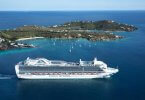Check out these five great spots to see this summer’s eclipse—but act quickly, as many tours and hotels are filling up. International eclipse-chasing is not a spur-of-the-moment kind of trip, but it certainly is an unforgettable one.
Note: Wherever you go, you’ll need to protect your eyes during certain parts of the eclipse. Look for solar eclipse glasses which comply with the ISO 12312-2 international safety standard.
Elqui Valley, Chile
Why go: Chile’s Elqui Valley has leaped onto the global stage as a world-class stargazing destination—and it’s a prime spot to experience totality during the July 2 eclipse. The valley, known for its pisco production and astronomical observatories, is expecting over a quarter-million visitors for the days surrounding the eclipse.
Plan your visit: While you won’t need a tour to experience totality here, it’s best to book all travel and accommodation in advance. After the one-hour flight from Santiago to La Serena (also in the path of totality), drive another hour to Vicuña, the epicenter of eclipse mania. Don’t forget to book an observatory tour when you’re in the area: Mamalluca Observatory offers tours in Spanish and English. (These National Geographic Lodges are top choices for nature’s most amazing natural light shows.)
San Juan, Argentina
Why go: As one of the largest cities in the path of totality, San Juan, Argentina, is one of the most popular eclipse destinations. Its population of 112,000 is expected to quintuple on the days surrounding the eclipse.
Plan your visit: Reach San Juan from Buenos Aires by a 14-hour drive or a 90-minute flight. To avoid overbooked flights, get creative on your timing: Consider spending a few days in the area, which is a great base for wine-tasting or history tours. On the day of the eclipse, head to one of the city’s main parks to view totality; Parque de Mayo or Plaza 25 de Mayo are both good options.
Cruising from French Polynesia
Why go: Mix astrotourism with snorkeling and cultural immersion by viewing the total solar eclipse aboard the small cruise ship, Paul Gauguin. The 15-day, round-trip cruise, offered by tour operators including TravelQuest, includes visits to some of French Polynesia’s most paradisiacal islands.
Plan your visit: After setting sail from Papeete, Tahiti, you’ll experience totality on day seven, bookended by shipboard lectures on Polynesia culture and visits to Bora Bora, Huahine, and atolls including Rangiroa. As if this trip isn’t bucket list–worthy enough, there’s an optional Easter Island add-on before the ship sets sail on June 26. (Find a tour already booked? Start planning for a Pacific cruise beneath the 2020 total solar eclipse instead.)
Oeno Island, Pitcairn Islands
Why go: Where the French Polynesia tour offers eclipse viewing at sea, Pitcairn Islands Tourism’s eight-day solar eclipse cruise includes viewing totality on uninhabited Oeno Island. This cruise sets sail from Mangareva, French Polynesia, on June 29, with a University of Canterbury professor, Dr. John Hearnshaw, serving as your astronomical guide.
Plan your visit: In addition to eclipse-watching on Oeno Island, you’ll have two days ashore Pitcairn Island, the only inhabited island of the eponymous archipelago. Recently named an official Dark Sky Sanctuary, the Pitcairns also offer stellar stargazing in pristine darkness every night.
Buenos Aires, Argentina
Why go: Buenos Aires is the only destination on this list where you won’t experience totality during the solar eclipse. In Buenos Aires, the moon will block just 99 percent of the sun, so you’ll need to keep those eclipse glasses on the entire time.
Plan your visit: Buenos Aires is a great option for those for whom one of the more far-flung destinations is out of reach. You don’t need to book a special tour to experience the eclipse—just look for the nearest city park with an unobstructed westward view. The Parque Central will likely draw crowds on the day of the event.







